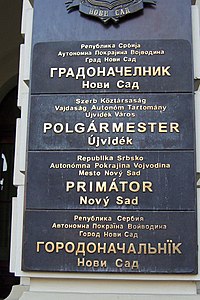
Photo from wikipedia
PURPOSE This study examined the effects of a vocabulary intervention for bilingual children that was conducted in children's first language, Spanish, and included explicit instruction on cognates. We measured effects… Click to show full abstract
PURPOSE This study examined the effects of a vocabulary intervention for bilingual children that was conducted in children's first language, Spanish, and included explicit instruction on cognates. We measured effects in terms of change from pre- to post-intervention in Spanish as well as associations with the non-target language, English. METHOD Participants were 12 Spanish-English bilingual children, aged 6-8 years, with and without Developmental Language Disorder. Children completed the intervention in pairs (one child with DLD and a typically developing peer) for 70-minute sessions, 3 days a week, for four weeks. Intervention targeted 32 words (16 cognates, 16 non-cognates) using four storybooks (8 words/book) and interactive activities that highlighted similarities across languages. Pre- and post-intervention measures in Spanish and English included tasks of word definition and cognate facilitation. RESULTS As a group, children showed improvement in definition quality and cognate naming in Spanish. There was a positive correlation between definition quality and cognate naming for the typically developing children, but not for the children with DLD. All children showed positive cross-language correlations on post-intervention measures. CONCLUSIONS Bilingual children, with and without DLD, have the capacity to improve in their awareness and use of cognates. Explicit teaching of cognates can be an effective tool for building vocabulary skills. Children with DLD may need additional time and support to apply their knowledge of cognates to vocabulary learning.
Journal Title: Journal of communication disorders
Year Published: 2020
Link to full text (if available)
Share on Social Media: Sign Up to like & get
recommendations!